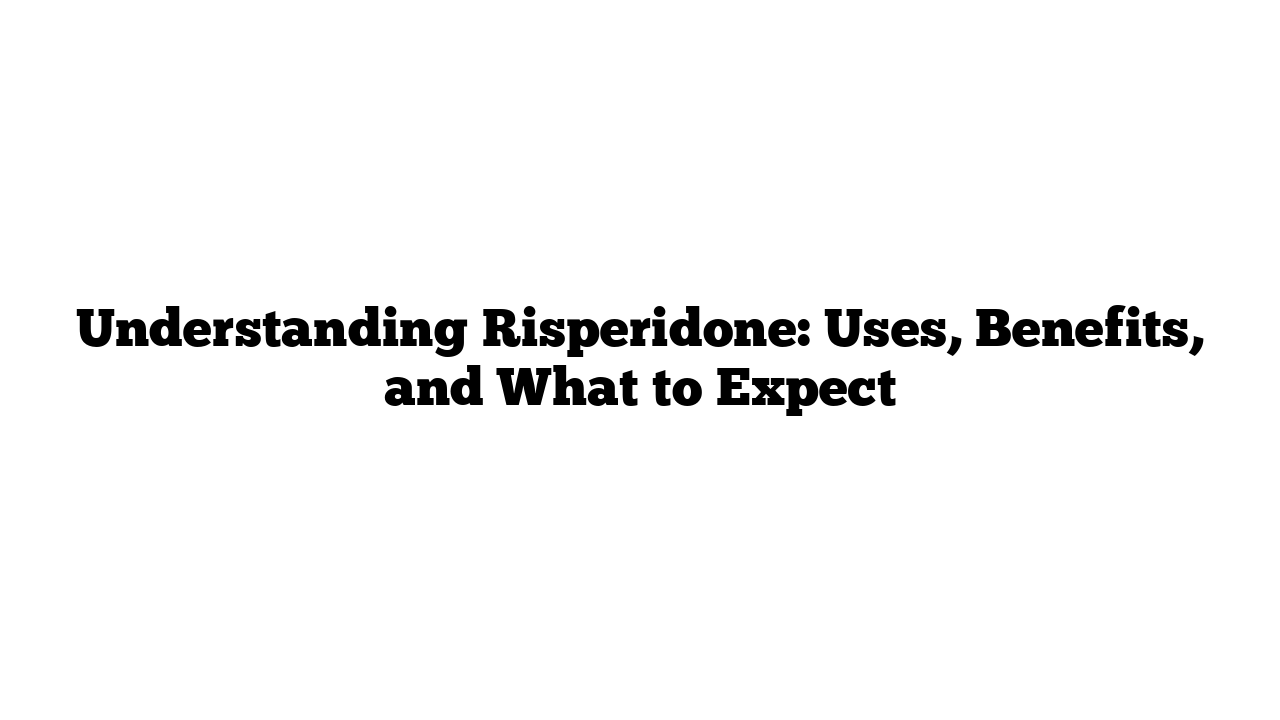Risperidone is a widely prescribed medication that has significantly impacted the treatment of mental health conditions. Whether you or a loved one has been prescribed this medication, understanding its uses, benefits, and potential effects is crucial.
This article covers everything you need to know about Risperidone, including its role in mental health care, proper usage, and what to watch for when taking it.
What Is Risperidone?
Risperidone is an antipsychotic medication that belongs to a class called atypical antipsychotics. It is primarily used to treat conditions such as:
- Schizophrenia
- Bipolar disorder (manic or mixed episodes)
- Irritability associated with autism spectrum disorder (ASD)
This medication works by balancing certain chemicals in the brain, particularly dopamine and serotonin, to improve mood, behavior, and thought processes.
Who Might Need Risperidone?
Risperidone is often prescribed for individuals experiencing:
- Hallucinations, delusions, or disorganized thinking (common in schizophrenia).
- Extreme mood swings or manic episodes (seen in bipolar disorder).
- Severe irritability, aggression, or self-harm behaviors (associated with autism).
For instance, in the USA, children diagnosed with autism often receive Risperidone to help manage severe behavioral challenges, improving their overall quality of life.
How Does Risperidone Work?
Risperidone affects the brain’s neurotransmitters, particularly dopamine and serotonin. By regulating these chemicals, it can:
- Reduce psychotic symptoms like hallucinations and delusions.
- Stabilize mood swings in bipolar disorder.
- Calm intense irritability and aggression in individuals with autism.
How to Take Risperidone Safely
Risperidone is available in various forms, including tablets, orally disintegrating tablets, and liquid solutions. Follow these tips for safe and effective use:
- Take Risperidone exactly as prescribed by your doctor.
- Avoid altering your dose without consulting your healthcare provider.
- If you miss a dose, take it as soon as possible unless it’s close to your next dose.
Potential Side Effects
Like all medications, Risperidone can have side effects. These vary by individual and dosage. Common side effects include:
- Drowsiness
- Weight gain
- Increased appetite
- Dizziness
- Nausea
Less common but more severe side effects may include:
- Tremors or rigidity
- Uncontrollable movements
- High blood sugar levels
- Low blood pressure
If you experience severe symptoms, consult your healthcare provider immediately.
Who Should Avoid Risperidone?
Certain individuals should exercise caution when taking Risperidone, such as:
- Older adults with dementia-related psychosis, as it increases the risk of stroke.
- People with a history of heart issues or uncontrolled diabetes.
- Pregnant or breastfeeding individuals should consult their doctor for personalized advice.
Interactions with Other Medications
Risperidone may interact with other drugs, including:
- Blood pressure medications
- Antidepressants
- Seizure medications
Inform your doctor about all medications and supplements you’re taking to avoid potential interactions.
Lifestyle Considerations While on Risperidone
- Monitor your diet: Some people experience weight gain or increased appetite. Opt for balanced meals and regular exercise.
- Stay hydrated: Risperidone may cause dry mouth or dehydration.
- Avoid alcohol: Combining alcohol with Risperidone can amplify side effects like drowsiness or dizziness.
What to Expect with Long-Term Use
Risperidone can be highly effective for managing mental health symptoms, but long-term use requires regular monitoring. Your doctor will likely schedule periodic check-ups to:
- Monitor side effects
- Adjust dosages as needed
- Check blood sugar and cholesterol levels
Where to Find Trusted Information
For more insights into mental health treatments, visit medicaltimes.io. Additional reliable resources include:
Top 10 FAQs About Risperidone
- What is Risperidone used for?
It treats schizophrenia, bipolar disorder, and irritability in autism. - How long does it take for Risperidone to work?
Most people notice improvements within 1-2 weeks, but full benefits may take several weeks. - Can children take Risperidone?
Yes, it is FDA-approved for managing irritability in children with autism. - Does Risperidone cause weight gain?
Weight gain is a common side effect, so monitor your diet and activity levels. - Can I stop taking Risperidone abruptly?
No, stopping suddenly can lead to withdrawal symptoms. Consult your doctor for a tapering plan. - Is Risperidone addictive?
Risperidone is not considered addictive, but it should be used as prescribed. - Can Risperidone make you sleepy?
Drowsiness is a common side effect, especially at the beginning of treatment. - What should I do if I miss a dose?
Take it as soon as you remember unless it’s close to your next scheduled dose. - Can pregnant women take Risperidone?
Consult your doctor, as its safety during pregnancy depends on individual circumstances. - How is Risperidone different from other antipsychotics?
It is an atypical antipsychotic with fewer side effects than older medications.
